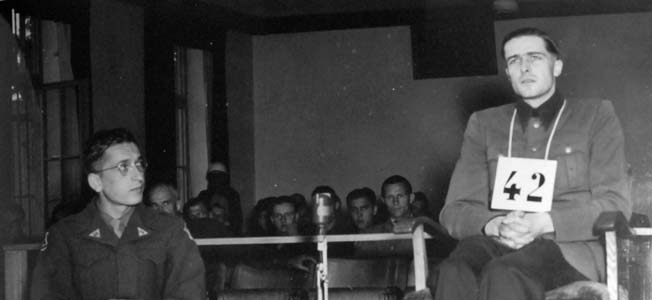

Peiper was caught by his past when on 23 June 1964 two Italians filed against him an accusation at the Central Office of the State Justice Administration for the Investigation of National Socialist Crimes in Ludwigsburg because of the Boves massacre. On the other hand, the statute of limitation for the prosecution of Nazi crimes had been extended several times, which made those who had been involved in these crimes uncomfortable. The prosecution was now initiated by the West German authorities themselves, and no longer by the Allies. The Eichmann and Auschwitz trials in the first half of the 1960s (which got a large audience in West Germany) put a new light on this period. The German economic recovery did not allow SS men to hide themselves, and holding a high position in society could raise questions that people like Peiper preferred to avoid. Moritz had become an authorized Volkswagen dealer for Germany.Īt the beginning of the Sixties the perception that the public opinion had of the Nazi crimes started to change. Peiper became a car sales trainer, and utilizing his network of former SS members, contacted Max Moritz, a former SS mechanic. The magazine Der Freiwillige, published by SS veterans, capitalized on the award and wrote that Peiper had been “unfairly sentenced” for war crimes.

At the request of the court, Porsche and Peiper reached an agreement to terminate the employment contract, and Peiper received six months of wages as compensation.
#Joachim peiper height trial
Citing documents published by the anti-Communist historian Freda Utley, he asserted that the Malmedy massacre trial defendants had been tortured by the Americans. He asserted that the Nuremberg trial and the “Malmedy massacre” trial were merely propaganda. In court documents Peiper’s attorney stated that Peiper was not a war criminal and that the Allies had used the trials to defame the German people. On 30 December 1960 Peiper filed suit to compel Porsche to fulfil its promises. The strong antipathy to Peiper, his association with Ferry Porsche and the related negative impact on sales in Porsche’s biggest market, the United States, forced Porsche’s management to dismiss him. Ferry Porsche personally intervened and promised Peiper a senior management position, but this offer was derailed by the trade unions, who objected to allowing persons convicted of war crimes to serve in the upper management of the company. This would not allow him to maintain this new position.Īs he advanced within Porsche, he was accused by Italian union workers of the Boves Massacre in Italy during World War II. He was later put in charge of auto exports to the United States but his wartime criminal conviction prevented him from obtaining a visa for travel to the United States. He would later represent the company at car exhibitions.

On 17 January 1957 he began work at Porsche in Stuttgart in its technical division. Peiper assisted the efforts of these organizations to rehabilitate the Waffen-SS’s reputation by hiding the more ruthless aspects of their past and exalting their military achievements, claiming that the SS were just like other soldiers. He avoided open affiliations with the HIAG and the Order of the Holders of the Knight’s Cross but he was often seen with their members at the funerals of personalities such as Kurt “Panzer” Meyer, Sepp Dietrich and Paul Hausser. Albert Prinzing, a former SS-Hauptsturmführer in the Sicherheitsdienst, he got a job at the car manufacturer Porsche.įollowing his release from Landsberg Prison Peiper maintained contact, albeit discretely, with his old comrades in the SS. To obtain his release from prison, Peiper had to prove that he could obtain a job. They then worked to achieve the conditional liberation of Peiper himself. The Hilfsgemeinschaft auf Gegenseitigkeit der Angehörigen der ehemaligen Waffen-SS (HIAG) (English: Mutual Help Association of Former Waffen-SS Members), a mutual aid network of former SS troops, had already helped Peiper’s wife find a job near the Landsberg Prison.


 0 kommentar(er)
0 kommentar(er)
